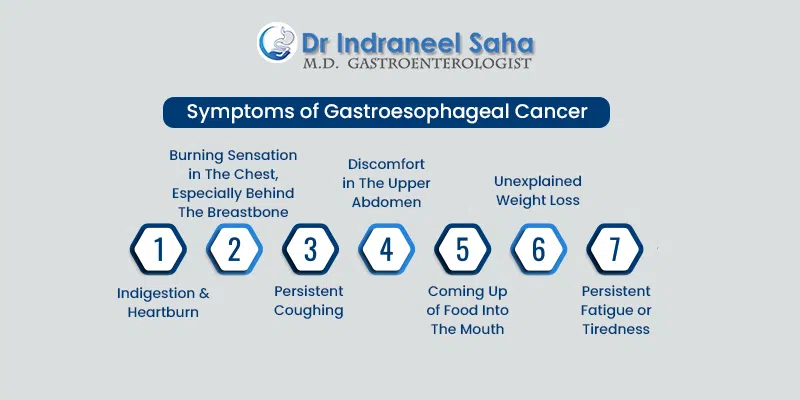- 27th Jan, 2025
- Gastroenterologist
How Gastro-Esophageal Cancer Affects Your Appetite
Do you struggle with swallowing food or drinks? Or there is a constant feeling that the food is stuck in the chest? In some patients, choking can be a common cause. However, when the congestion is accompanied by pain, it might be an indication of narrowing of the esophagus due to cancer.
In fact, this is the most prevalent symptom in patients diagnosed with gastroesophageal cancer. The simple act of eating food or drinking fluid becomes a struggle for such patients.
Now, what is this type of cancer and how is it different from stomach and esophageal cancer? Let’s delve into the details.
Understanding Gastroesophageal Cancer?
When there is an uncontrolled growth of abnormal cells at the junction where the food pipe (esophagus) joins the stomach, it is known as gastroesophageal cancer. It is also known as oesophago gastric junctional cancer.
One of the most profound impacts of this type of cancer on individuals is the loss of appetite, says Dr. Indraneel Saha, a leading gastro doctor in Kolkata. As the cancer starts to progress, there is a change in the eating habits of patients. They begin to reduce the intake of food, which ultimately disrupts the digestive system. Decreased food consumption results in malnutrition and sudden weight loss.
How Is It Different From Stomach And Esophageal Cancer?
Gastroesophageal cancer is distinct and different from both stomach and esophageal cancer. While these two types of cancer affect the respective organs, gastroesophageal cancer presents challenges and troublesome symptoms in both organs.
Symptoms Of Gastroesophageal Cancer
The diagnosis of gastroesophageal cancer is very difficult because it is present with symptoms that are similar to gastrointestinal issues. Here are some of the common signs that patients experience:
- Indigestion and heartburn
- Burning sensation in the chest, especially behind the breastbone.
- Persistent coughing
- Discomfort in the upper abdomen
- Coming up of food into the mouth
- Unexplained weight loss
- Persistent fatigue or tiredness

Having one or more symptoms does not necessarily mean that one has gastroesophageal cancer, as these signs are related to other conditions as well. However, if any of these symptoms persist or worsen over time, make sure to consult a reputed gastro doctor in Kolkata.
He will conduct a thorough assessment to determine the underlying cause of your condition and prepare a treatment plan if it is related to any gastrointestinal issues. In case the symptoms point towards cancer, the gastroenterologist will refer you to an oncologist for further evaluation.
Gastroesophageal Cancer: A Look At Its Impact On Appetite
Gastroesophageal cancer happens when there is an abnormal growth of the cancerous cells, which soon starts spreading. So, as the tumour grows in size, it narrows down the esophagus. This obstruction makes it difficult for the food particles and liquids to pass through, thereby leading to discomfort and choking.
Soon when the cancer starts to advance, it disrupts the functioning of the lower sphincter muscles, which eventually leads to inflammation in the esophagus, regurgitation of food or liquids, heartburn and chest pain.
When gastroesophageal cancer reaches the advanced stage, it leads to bleeding in the stomach and esophagus lining, due to which many individuals have blood during vomiting. If not treated at the right time, the malignant cells even reach the nearby lymph nodes, making treatment more complicated.
Final Words
Gastroesophageal cancer is rare but often a lethal condition that calls for increasing importance as a public health concern. Hence, if you are experiencing any unusual symptoms, get in touch with your gastro doctor in Kolkata to detect the issue at the initial stage. The earlier the symptoms get recognised, the more successful the treatment approach.